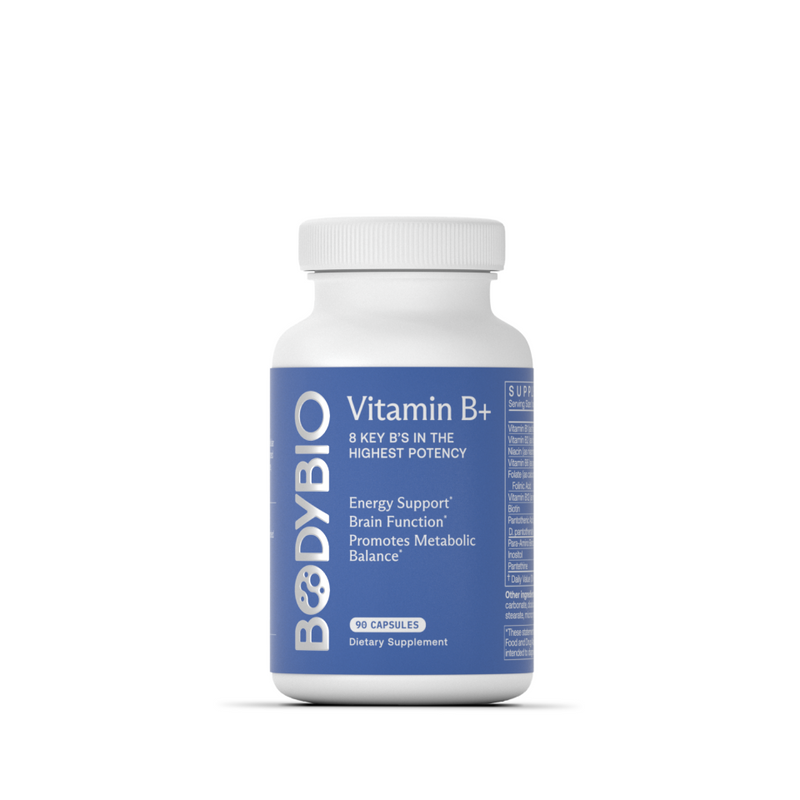Folinic Acid Benefits for Cognitive Health and Development
Authors:

Ashley Palmer
Nutritional Therapy Practitioner, Health & Wellness Expert
Key Takeaways:
Lately, you may have noticed folinic acid sweeping the headlines for its cognitive, mood, and overall wellness support. While it might sound like the “new kid on the block,” the truth is that folinic acid has been a trusted, superior form of vitamin B9 for decades.
At BodyBio, we’ve known this all along. That’s why our Vitamin B+ complex has always contained folinic acid (instead of folic acid)—because we’re committed to using the forms of nutrients that truly work with your body.
In this post, we’ll break down why folinic acid is different from the more common folic acid, why it’s a game-changer for brain and metabolic health, and why choosing the right form of vitamin B9 makes all the difference in your health and well-being.
Table of Contents:
-
What Is Folinic Acid?
-
Folinic Acid vs. Folic Acid: Key Differences
-
Why Folinic Acid Matters for Cognitive Health
-
Folinic Acid Benefits for Brain Development and Pregnancy
-
How Folinic Acid Works With All B Vitamins for Metabolic and Cognitive Support
-
BodyBio’s Commitment to Folinic Acid in Vitamin B+
-
Why You Need Folinic Acid
What Is Folinic Acid?
Vitamin B9 is one of the most essential nutrients in the body. It helps regulate methylation—the biochemical process that makes vitamins, amino acids, and lipids usable by your cells. It also supports neurotransmitter production, cardiovascular health, and cellular repair.
But not all forms of B9 are created equal.
Folinic acid, also called 5-formyl tetrahydrofolate, is an active metabolite of folic acid and a highly bioavailable form of vitamin B9. Unlike synthetic folic acid, folinic acid doesn’t need to go through complex enzyme conversions to become usable by the body. That makes it more efficient, more reliable, and more effective at delivering the benefits of vitamin B9.
Folinic acid is so powerful that it’s often used in medicine as a “rescue therapy” for patients taking methotrexate in cancer treatments—because it bypasses the blocked pathways folic acid relies on, restoring folate to healthy cells.
Folinic Acid vs. Folic Acid: Key Differences
Here’s where confusion often arises: folate, folic acid, and folinic acid are frequently used interchangeably, but they’re not the same.
-
Folic Acid: A synthetic form of B9, widely used in cheap supplements and food fortification. It requires multiple conversions in the liver through enzymes like DHFR before it can become biologically useful in the body. For up to 40% of the world’s population with MTHFR gene variants, this process doesn’t work efficiently, leading to poor absorption, unmetabolized folic acid buildup, and elevated homocysteine levels.
-
Folinic Acid: Already biologically active, folinic acid bypasses these enzymatic roadblocks. It doesn’t rely on MTHFR to do its job, which means it can be absorbed and put to work immediately by your body.
-
Folate: The active form of vitamin B9 used in the body. By supplementing with folic acid or folinic acid, we are trying to get the body to make folate that is usable in our cells.
TL;DR: folic acid is inefficient and problematic for many people, while folinic acid offers a direct, effective form of vitamin B9.
Why Folinic Acid Matters for Cognitive Health
Your brain depends on folate to function. Vitamin B9 is a cofactor in producing neurotransmitters like serotonin, dopamine, and norepinephrine—the chemical messengers that regulate mood, motivation, and focus.
When folic acid can’t be metabolized properly (such as in those with MTHFR variants), neurotransmitter production suffers. This can contribute to issues like brain fog, mood instability, and cognitive decline.
Folinic acid ensures your body gets the usable form of B9 it needs to:
-
Support healthy neurotransmitter synthesis.
-
Regulate homocysteine levels (elevated homocysteine is linked to neurodegeneration and poor cognition as well as cardiovascular issues).
-
Improve overall brain energy, focus, and mood.
By skipping the conversion bottlenecks, folinic acid helps your brain function more efficiently—something folic acid simply can’t guarantee.
Folinic Acid Benefits for Brain Development and Pregnancy
Pregnancy dramatically increases the body’s demand for folate. The developing fetus relies on vitamin B9 for rapid cell division and especially for neural tube development. Without adequate folate, risks for neural tube defects like spina bifida increase significantly.
For decades, folic acid supplementation has been recommended during pregnancy—but the problem is clear: many women can’t metabolize folic acid effectively, leaving a gap when nutrition matters most.
Folinic acid provides a solution:
-
It bypasses the need for enzymatic conversion.
-
It supports fetal brain and nervous system development directly.
-
It offers a safer, more reliable form of B9 for women with genetic predispositions like MTHFR.
In short, folinic acid doesn’t just support brain development—it helps ensure the most vulnerable stages of growth are nourished without compromise. This is why BodyBio healthcare practitioners have been recommending BodyBio Vitamin B+, which includes folinic acid alongside the full range of B vitamins, to their patients for years.
How Folinic Acid Works With All B Vitamins for Metabolic and Cognitive Support
Vitamin B9 doesn’t work in isolation—it’s part of the full family of B vitamins that act as coenzymes in nearly every major metabolic pathway. Folinic acid pairs especially closely with vitamin B12, helping convert homocysteine into methionine, an amino acid essential for methylation, energy production, and nervous system health. Without enough folate or B12, this process stalls, leaving homocysteine elevated—a risk factor for heart disease, cognitive decline, and mood imbalances.
But folinic acid’s teamwork extends beyond B12:
-
With B6 (pyridoxine): Together they help process amino acids, build neurotransmitters like serotonin, and support mood balance.
-
With B2 (riboflavin): Folinic acid relies on B2-dependent enzymes in one-carbon metabolism, which is central to DNA synthesis and repair.
-
With niacin (B3): Both contribute to redox reactions that generate ATP, the cellular energy currency your brain and body run on.
This synergy is why taking B vitamins in a balanced complex—rather than in isolation—can be so effective. In addition to its unique benefits, folinic acid helps optimize the performance of its neighboring B vitamins, ensuring your cells get the full spectrum of metabolic and cognitive support.
At the end of the day, the Bs are like a network. When one is missing—or present in the wrong form—the whole system struggles. Folinic acid helps keep that network running smoothly, protecting both your cellular energy and your mental clarity.*
BodyBio’s Commitment to Folinic Acid in Vitamin B+
At BodyBio, we’ve always believed in going beyond the cheap, easy, or conventional option to deliver supplements that truly work with human biology.
That’s why BodyBio Vitamin B+ has always contained folinic acid instead of folic acid. Long before it was widely recognized, we knew that folinic acid’s superior bioavailability made it the better form of B9 for long-term health, cognitive support, and prenatal care.*
This is part of our commitment to cellular health: choosing nutrient forms that make a real difference at the cellular level—because your body deserves the best, not the shortcut.
Why You Need Folinic Acid
Folinic acid isn’t just “another form” of vitamin B9—it’s a superior, bioavailable nutrient that supports your brain, your mood, and even the earliest stages of life. Unlike folic acid, it works reliably for everyone, including those with MTHFR variants, and it helps ensure that critical processes like methylation and neurotransmitter synthesis can run smoothly. Supporting brain function, energy, and cellular health for all ages.

